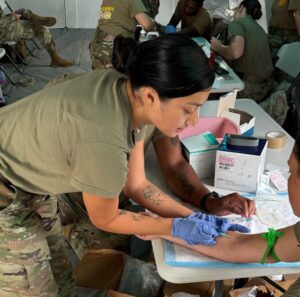As we age, taking care of our health becomes more important. To maintain quality of life, you may need to make healthy changes to your daily routine. This September, Healthy Aging Month, is a great time for us to pause and reflect on the best ways to stay healthy as we age.
Research has shown that maintaining healthy habits throughout your life can help improve your quality of life as you age. However, it is never too late to start engaging in healthy habits! Healthy choices have positive effects at any time, even if you have not followed them throughout your life.
Here are five tips to help you stay active and enjoy life well into your golden years!
1. Stay physically active
Physical activity can provide significant health benefits to older adults. According to the Department of Health and Human Services, regular exercise increases mobility making it easier to perform activities of daily living such as bathing, dressing or getting in and out of bed. Active seniors are also less likely to fall and have a lower risk of chronic disease, dementia, anxiety and depression. Even frail individuals or those with chronic illnesses or disabilities can benefit from physical activity as long as they stay within their doctor’s recommendations.
The Department of Health and Human Services’ Physical Activity Guidelines recommend that older adults aim to do 150 – 300 minutes of moderate-intensity activity a week or 75 – 150 minutes of vigorous-intensity activity. This activity should include both aerobic (also known as cardio or endurance) activities and muscle-strengthening activities. Individuals should determine their fitness level and ability to exercise safely with their doctor before starting an exercise program.
Some examples of aerobic and muscle-strengthening activities are:
- Walking or hiking
- Dancing
- Water aerobics
- Bicycle riding
- Carrying groceries
- Swimming
- Tai chi
- Yard work and gardening
- Body-weight exercises
2. Eat well
Eating a healthy diet is essential to maintaining a healthy lifestyle, and it is never too late to make healthy changes. Nutrient-dense foods can help mitigate the risks of conditions such as heart disease, cancer and osteoporosis.
The U.S. Department of Health and Human Services (HHS) recommends eating more fruits, vegetables, whole grains and dairy and cutting down on added sugars, saturated fat and sodium. Older adults often don’t eat enough protein, and foods like meat, seafood, beans, peas and eggs can help increase protein intake.
Older adults are also prone to dehydration because the sensation of thirst declines. However, drinking water periodically throughout the day can assist digestion and help prevent dehydration. The HHS also recommends unsweetened fruit juices, low-fat or fat-free milk or fortified soy beverages to meet fluid and nutrient needs.
3. Engage your mind
Staying engaged intellectually can benefit your brain health and overall well-being. Activities such as reading books, playing games, taking a class or learning a new skill enhance memory and cognitive function. According to the National Institute on Aging, people who participate in personally meaningful activities, such as volunteering, say they feel happier and healthier.
Managing stress is also a big part of staying mentally healthy. Chronic stress can affect your memory and increase your risk for Alzheimer’s and other dementias. Activities such as exercising, journaling, mindfulness practices and breathing techniques can help you manage stress in your day-to-day life.
4. Quit unhealthy habits
A big part of maintaining your health is cutting out unhealthy habits, especially smoking and excessive alcohol use. Research shows that quitting smoking at any age will lower your cancer, heart attack, stroke and lung disease risk. It will also improve your blood circulation and senses of taste and smell.
The National Institute on Aging recommends that older adults avoid or limit their alcohol intake. Physical changes that come with aging can make seniors more vulnerable to alcohol misuse and dependence. In addition, the National Institute on Alcohol Abuse and Alcoholism reports that alcohol production among older adults is on the rise. Limiting or eliminating alcohol from your diet can improve your heart health and prevent premature aging.
Older adults should also be cautious about becoming dependent on other substances, such as opioids commonly prescribed for pain. Contact a doctor or mental health professional if you need help with substance or alcohol abuse.
5. Maintain social networks
Lastly, maintaining a solid social support network can provide positive opportunities for connection and enrichment. While the size of your social network may vary based on your personality and circumstances, it is important that you feel like you have someone to connect with.
Don’t be afraid to get out into your community to expand your social networks. Volunteering at a meaningful organization, joining a club or becoming a mentor provides opportunities to meet new people. Senior centers and religious places of worship also allow you to meet people with similar values and interests. Social media can also be an excellent way to reconnect with old friends and acquaintances and become a part of new communities.
Though we may not be able to turn back the clock, by making healthy choices throughout our lives – regardless of our age – we can positively affect our quality of life as we age. Staying physically active, eating well, engaging your mind, quitting unhealthy habits, and maintaining social networks are all excellent ways to improve your health and wellbeing as you get older. Where will you start?




